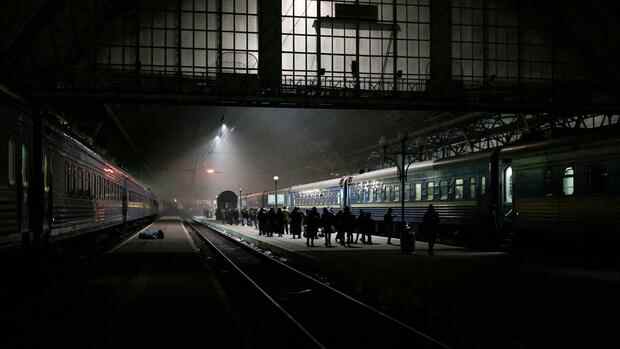Good morning dear readers,
Yesterday morning, many people in Germany and Europe were confronted with a fear that never went away, but hasn’t been that close for a long time: with the fear of a nuclear catastrophe.
According to officials, Russian troops shot at Europe’s largest nuclear power plant from Thursday to Friday during fighting near the southern Ukrainian city of Zaporizhia. A fire broke out. Although it was deleted after a few hours, the radiation levels in the area remained unchanged, according to the International Atomic Energy Agency. But the world had changed again overnight.
Nothing is like it was before the invasion. Every day there are new – often disturbing – situations that force you to rethink within a very short time. Also Germany.
Top jobs of the day
Find the best jobs now and
be notified by email.
This can be seen once again in the case of nuclear power: At the beginning of the week, Germany was discussing extending the service life of the last three nuclear power plants in the country beyond 2022 due to growing doubts about the reliability of Russian gas supplies. Even Economics Minister Robert Habeck did not rule that out categorically – and thus touched on a taboo for the Greens.
The energy companies, which had just declared unanimously that an extension of the term was out of the question for them, signaled their willingness to talk.
The debate should now fall silent again. Because, as the Ministry of the Environment warned from Green politician Steffi Lemke on Thursday: Especially in times of war, an extension of the service life could be possible Make Germany “particularly vulnerable”.
The incident near Zaporizhia caused horror not only in Europe but worldwide. The Handelsblatt analyzes the situation, looks at the other nuclear power plants in Ukraine and provides answers to the most pressing questions.
What else kept us busy this week:
1. Speaking of energy supply: Germany will remain dependent on Russia for the time being. That drives up gas prices. The European gas price rose above the EUR 200 per megawatt hour mark for the first time on Friday. This set a new record. The federal government and the EU Commission are trying hard to reduce dependence on Russian natural gas. In the short term, however, imports from Siberia will not be fully offset if deliveries fail.
2. Nord Stream 2 has been stopped for the time being – and no one cares anymore: neither about the contents of the pipeline, nor about its maintenance and safety. The Baltic Sea pipeline contains 330 million cubic meters of natural gas. That amount could supply more than 100,000 single-family homes in Germany with gas for a year.
3. A large Russian military convoy 64 kilometers long has been rolling towards Kyiv for days. The US company Maxar has published several satellite images of it. But Volodymyr Zelensky remains in his capital. Putin’s invasion made the Ukrainian president a champion of Western values. Against Russia’s missiles Zelensky uses the weapons of the word, against propaganda social media. My colleague Hans-Jürgen Jakobs wrote a portrait of the “freedom hero who came out of the television”.
The Vice-Chancellor did not rule out extending the lifetime of nuclear power plants.
(Photo: dpa)
4. In Russia, on the other hand, hardly any companies want to remain. The list of corporations that are restricting or ending their business with the country is getting longer and longer. After large oil and energy companies such as Shell and BP announced their withdrawal from the Russian market at the beginning of the week, more and more companies from a wide variety of industries followed suit – including from Germany.
5. The fate of the people in Ukraine affects many German companies – according to the refugee agency UNHCR, more than a million people have already fled the war zones. The commitment of the companies is great: They donate money, organize aid transports or provide accommodation for refugees.
6. Four countries have sided with Russia in the UN General Assembly vote on Ukraine and voted against the resolution calling for an end to Russia’s “aggression”. Even if the signal sent out by the 141 supporter countries was clear: 35 countries abstained and twelve did not vote at all. Our analysis shows which countries support Putin, which are taking action against him and which are keeping their options open.
7. There have never been such comprehensive sanctions against a country as against Russia. The EU, UK and US have come forward with banning Russian financial institutions from Swift and banning foreign exchange for the central bank. The ruble has plummeted, the stock exchange in Moscow does not dare to open. Russia’s decoupling is correct, writes my colleague Jan Hildebrand in his commentary, but “it also entails risks”.
8th. The Bundeswehr is to receive a special fund of 100 billion euros for investments and armament projects. The German armaments industry, above all Rheinmetall, is ready. The group has already made an offer to the federal government. The package includes, among other things, ammunition, helicopters and chain and wheeled armor, CEO Armin Papperger told the Handelsblatt. The total volume adds up to 42 billion euros.
9. One reads a lot about Russian oligarchs these days. They condemn the war, criticize the sanctions imposed on them or sell company shares to escape the sanctions pressure from the West. And a few are even rehearsing an uprising against Putin. You can read in our overview which Russian billionaires are on the blacklist and which names are still missing.
I wish you a nice weekend despite the worrying times.
sincerely
Your
Kirsten Ludowig
Deputy Editor-in-Chief Handelsblatt
You can receive the Morning Briefing plus free of charge as part of your Handelsblatt digital subscription or subscribe separately here.

